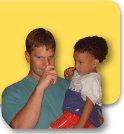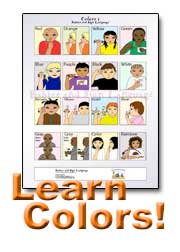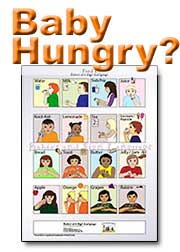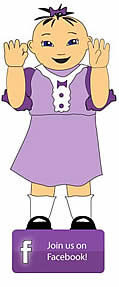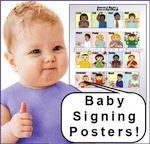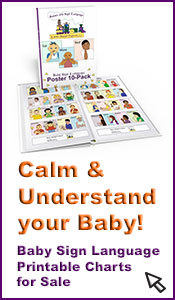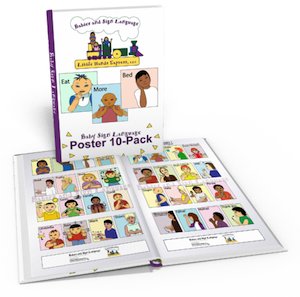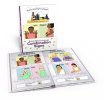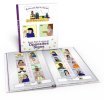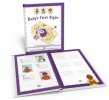Babies Babbling in Sign Language
Do babies babble in sign language? You bet!
The typical age for hearing babies to start making vocal noise is anywhere from 6-9 months. This is the age that researchers are now focusing to study sign language babbling. They believe this is the time when babies are processing language. This is also about the time babies try to match sound (if applicable) and rhythm of the surrounding language.
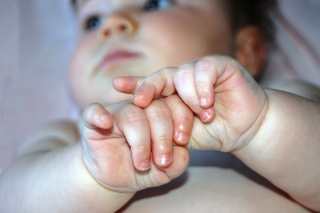 Whether the baby is hearing or Deaf, being exposed to sign language has an impressive stimulus on babies' expressive language (i.e. what language they use to communicate to others). Regardless if the child has a hearing loss and their main language is sign, they may babble with their hands.
Whether the baby is hearing or Deaf, being exposed to sign language has an impressive stimulus on babies' expressive language (i.e. what language they use to communicate to others). Regardless if the child has a hearing loss and their main language is sign, they may babble with their hands.
If Deaf parents have a hearing child, these children are labeled a CODA (Child of a Deaf Adult) within the Deaf community. CODAs have the opportunity to grow up in a rich Deaf Culture environment, while still becoming part of the mainstream hearing society.
It is in these children that researchers are seeing hand babbling similar to American Sign Language (ASL). Intensive studies are not yet available involving a Deaf infant of Deaf parents yet, however, if you ask any Deaf parent of a Deaf child, this parent will almost certainly tell you that their baby does indeed babble in sign language! Surely this fits the mold: A hearing child of Deaf adults is able to copy their parents’ signs. Why wouldn’t a Deaf infant (of Deaf parents) be able to do the same?
| In a study involving six hearing infants (three with hearing parents who used only spoken English and three with Deaf parents who used only American Sign Language), researchers tried to figure out if sign babble had any linguistic qualities. The three infants with Deaf parents actually had hand babble similar in rhythm to their parents’ signing whereas the hearing infants’ hand babble had no resemblance to ASL rhythm. This sign babble, researchers say, is the equivalent to vocal baby babble. |
As your signing baby becomes a toddler, s/he will start to acquire more complex syntax in sign language. Your little darling will soon realize the importance of facial expressions and how they impact the signed message. It is also natural for the signing toddler to understand more signs than they can produce.
Toddlers may have a signing vocabulary of 80 words, but can understand up to 300 words or more! This vocabulary is particularly helpful if and when your child hits the "terrible two" stage. Your "little big guy" is now able to express himself more easily; which in turn reduces frustration.
Since ASL is a visual language, it is possible for a toddler to sign something that may not necessarily be a sign. She or he may be describing a scene or a manner of dress which incorporates body language and their imagination. With this language as their tool, they may be able to create their own signs for things that aren’t "really" signs. How creatively intelligent!
One example is the sign for "happy":
| If a child is overjoyed and they feel more than just "happy," they could make the sign bigger. A direct English translation for this could be "big happy!" It is not correct English or ASL grammar however, but the idea is still expressed clearly through a made-up sign. |
Young children and sign language is still a linguistic discovery that obviously has room for more research. Sign languages, as far as the public view goes, is still relatively new (even though this has been documented for over 300 years). It wasn’t until recently that the US government recognized ASL as a true language.
The benefits of linguistic development for babies using sign language are tremendous, obvious, and many. It is only a matter of time until more research will prove what many have already experienced (for hundreds of years!) with babies acquiring sign language.
Return from "Baby Babble/Babbling in Sign Language" to
"Babies and Sign Language" Homepage

